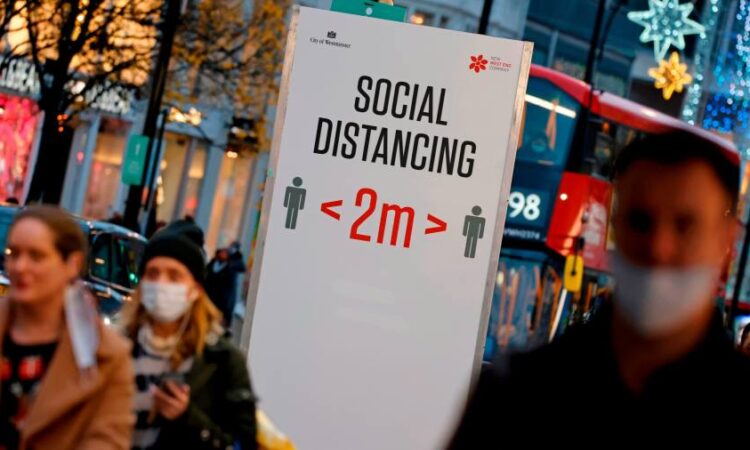
Receive free Coronavirus updates
We’ll send you a myFT Daily Digest email rounding up the latest Coronavirus news every morning.
Lockdowns and other social distancing measures significantly cut the transmission of the coronavirus during the pandemic, according to a report published on Thursday, which has been submitted to the UK Covid-19 inquiry.
The Royal Society examined hundreds of studies from around the world on the effectiveness of so-called non-pharmaceutical interventions, such as mask-wearing and border controls, that were used to try to stem the spread of the virus before the development of vaccines.
In their report, researchers at the UK’s independent scientific academy found masks were highly effective at cutting transmission and that mask-wearing, border controls and shutdowns were most useful when introduced early, while case numbers were lower, and in combination.
Professor Sir Mark Walport, foreign secretary of the Royal Society and chief scientific adviser to the UK government between 2013 and 2017, said one of the main lessons to come out of the pandemic was to “be prepared”.
“Governments on the whole are better prepared [than before Covid]. The last emergency was a major pandemic and so we should be better prepared for it next time. But viruses are dangerous things,” he said.
The Covid inquiry is examining the UK’s response to the pandemic, including the decisions to lock down and introduce other social distancing measures, testing and contact tracing, and masking. It will last at least until 2026.
The Royal Society researchers concluded that lockdowns and social distancing measures were the most significant intervention, with some studies suggesting they could have reduced the reproduction number of the virus by more than 50 per cent.
In care homes, restricting visitor numbers, keeping residents apart and allocating individual staff to specific residents all reduced transmission.
The researchers pointed to Hong Kong, South Korea and New Zealand as examples of where stringently implemented lockdowns resulted in extremely low domestic transmission.
But their report did not consider the broader impacts of lockdowns such as the effects on the economy, children’s education and people’s mental health.
Chris Dye, professor of epidemiology at the University of Oxford, who examined the mask studies, said there was “surprisingly overwhelming evidence” that they cut transmission, especially N95 respirators.
He said they should be used by people working with vulnerable adults and children whenever rates of Covid or other respiratory illnesses were high.
In January 2023, a review by Cochrane, a non-profit organisation that issues medical guidance, of the randomised controlled trials found no clear link between encouraging people to wear masks and reducing infection.
But Dye said that since there were not many randomised controlled trials from which to draw conclusions, the Royal Society had looked at a broader range of studies and found they consistently reported that mask-wearing and mask mandates cut transmission.
The researchers found that border controls were less consistently effective in preventing infection. While strict quarantine policies did significantly reduce the number of infected passengers entering a given country, measures such as symptom screening or taking travellers’ temperature failed to stop the virus crossing borders.
Christl Donnelly, professor of statistical epidemiology at Imperial College London, who led the research into lockdowns, said the pandemic had been “unique” because so many countries implemented measures to curb viral spread.
“There’s absolutely no reason to think this only applies to Covid and wouldn’t apply to other respiratory diseases,” she said.






